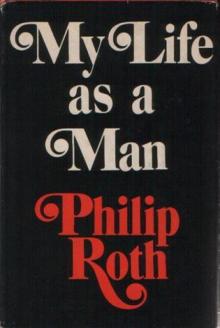- Home
- Philip Roth
Everyman Page 6
Everyman Read online
Page 6
She was a lean, tall, gray-haired woman, within a year or two of his age, whose appearance and gentleness reminded him of Phoebe. Her name was Millicent Kramer, and she was the best of his students by far and, coincidentally, the least messy. She alone, in what he charitably called "Advanced Painting," managed to finish each class without having dripped paint all over her running shoes. He never heard her say, as others did, "I can't get the paint to do what I want it to do," or "I can picture it in my mind but I can't seem to get it on the canvas," nor did he ever have to tell her, "Don't be intimidated, don't hold back." He tried to be generous to them all, even the hopeless ones, usually those very ones who came in and said right off, "I had a great day—I feel inspired today." When finally he'd heard enough of that, he repeated to them something he vaguely remembered Chuck Close's having said in an interview: amateurs look for inspiration; the rest of us just get up and go to work. He didn't start them with drawing, because barely a one of them was able to draw, and a figure would have set up all sorts of problems of proportion and scale, so instead, after they'd finished a couple of sessions going over the rudiments (how to lay their paints out and arrange their palettes, and so on) and familiarizing themselves with the medium itself, he set up a still life on a table—a vase, some flowers, a piece of fruit, a teacup—and encouraged them to use it as a reference point. He told them to be creative in order to try to get them to loosen up and use their whole arm and paint, if possible, without fear. He told them they didn't have to worry about what the arrangement actually looked like: "Interpret it," he told them, "this is a creative act." Unfortunately, saying that sometimes led to his having to tell someone, "You know, maybe you shouldn't make the vase six times larger than the teacup." "But you told me I should interpret it" was invariably the reply, to which, as kindly as he could, he in turn replied, "I didn't want that much interpretation." The art-class misery he least wished to deal with was their painting from imagination; yet because they were very enthusiastic about "creativity" and the idea of letting yourself go, those remained the common themes from one session to the next. Sometimes the worst occurred and a student said, "I don't want to do flowers or fruit, I want to do abstraction like you do." Since he knew there was no way to discuss what a beginner is doing when he does what he calls an abstraction, he told the student, "Fine—why don't you just do whatever you like," and when he walked around the studio, dutifully giving tips, he would find, as expected, that after looking at an attempt at an abstract painting, he had nothing to say except "Keep working." He tried to link painting to play rather than to art by quoting Picasso to them, something along the lines of their having to regain the child in order to paint like a grownup. Mainly what he did was to replicate what he'd heard as a kid when he started taking classes and his teachers were telling him the same things.
He was only called upon to be at all specific when he stood beside Millicent and saw what she could do and how fast she got better. He could sense right off that she had a knack that was innate and that far exceeded what little gift some of the others began to demonstrate as the weeks went by. It was never a question with her of combining the red and the blue right off the palette but rather of modifying the mixture with a little black or with just a bit of the blue so that the colors were interestingly harmonious, and her paintings had coherence instead of falling apart everywhere, which was what he confronted much of the time when he went from easel to easel and, for lack of anything else he could think of, heard himself saying, "That's coming along well." Millicent did need to be reminded "Don't overwork it," but otherwise nothing he suggested was wasted on her and she would look for the slightest shade of meaning in whatever he told her. Her way of painting seemed to arise directly from her instincts, and if her painting didn't look like anyone else's in the class, it wasn't solely because of stylistic distinction but because of the way she felt and perceived things. Others varied in their neediness; though the class was largely full of good will, some still resented it when they needed help at all, and even inadvertent criticism could make one of the men, a former CEO of a manufacturing company, frighteningly touchy. But never Millicent: she would have been the teacher's most rewarding pupil in anyone's amateur painting class.
Now he sat beside her on the bed and took her hand in his, thinking: When you are young, it's the outside of the body that matters, how you look externally. When you get older, it's what's inside that matters, and people stop caring how you look.
"Don't you have some medication you can take?" he asked her.
"I took it," she said. "I can't take any more. It doesn't help but for a few hours anyway. Nothing helps. I've had three operations. Each one is more extensive than the last and more harrowing than the last, and each one makes the pain worse. I'm sorry I'm in such a state. I apologize for this."
Near her head on the bed was a back brace she'd removed in order to lie down. It consisted of a white plastic shell that fit across the lower spine and attached to a web of elasticized cloth and Velcro straps that fastened snugly over the stomach an oblong piece of felt-lined canvas. Though she remained in her white painting smock, she had removed the brace and tried to push it out of sight under a pillow when he opened the door and walked in, which was why it was up by her head and impossible not to be continually mindful of while they talked. It was only a standard back brace, worn under the outer clothing, whose plastic posterior section was no more than eight or nine inches high, and yet it spoke to him of the perpetual nearness in their affluent retirement village of illness and death.
"Would you like a glass of water?" he asked her.
He could see by looking into her eyes how difficult the pain was to bear. "Yes," she said weakly, "yes, please."
Her husband, Gerald Kramer, had been the owner, publisher, and editor of a county weekly, the leading local paper, that did not shy away from exposing corruption in municipal government up and down the shore. He remembered Kramer, who'd grown up a slum kid in nearby Neptune, as a compact, bald, opinionated man who walked with considerable swagger, played aggressive, ungainly tennis, owned a little Cessna, and ran a discussion group once a week on current events—the most popular evening event on the Starfish Beach calendar along with the screenings of old movies sponsored by the film society—until he was felled by brain cancer and was to be seen being pushed around the village streets in a wheelchair by his wife. Even in retirement he'd continued to have the air of an omnipotent being dedicated all his life to an important mission, but in those eleven months before he died he seemed pierced by bewilderment, dazed by his diminishment, dazed by his helplessness, dazed to think that the dying man enfeebled in a wheel-chair—a man no longer able to smash a tennis ball, to sail a boat, to fly a plane, let alone to edit a page of the Monmouth County Bugle—could answer to his name. One of his dashing eccentricities was, for no special reason, to dress up from time to time in his tuxedo to partake of the veal scaloppine at the village restaurant with his wife of fifty-odd years. "Where the hell else am I going to wear it?" was the gruffly engaging explanation that went out to one and all—he could sometimes woo people with an unexpected charm. After the surgery, however, his wife had to sit beside him and wait for him to crookedly open his mouth and then feed him gingerly, the swaggering husband, the roughneck gallant, with a spoon. Many people knew Kramer and admired him and out on the street wanted to say hello and ask after his health, but often his wife had to shake her head to warn them away when he was in the depths of his despondency—the vitriolic despondency of one once assertively in the middle of everything who was now in the middle of nothing. Was himself now nothing, nothing but a motionless cipher angrily awaiting the blessing of an eradication that was absolute.
"You can continue to lie here if you like," he said to Millicent Kramer after she had drunk some of the water.
"I can't be lying down all the time!" she cried. "I just cannot do it anymore! I was so agile, I was so active—if you were Gerald's wife, you had to be. We went everywhere. I felt
so free. We went to China, we went all over Africa. Now I can't even take the bus to New York unless I'm laced to the gills with painkillers. And I'm not good with the painkillers—they make me completely crazy. And by the time I get there I'm in pain anyway. Oh, I'm sorry about this. I'm terribly sorry. Everybody here has their ordeal. There's nothing special about my story and I'm sorry to burden you with it. You probably have a story of your own."
"Would a heating pad help?" he asked.
"You know what would help?" she said. "The sound of that voice that's disappeared. The sound of the exceptional man I loved. I think I could take all this if he were here. But I can't without him. I never saw him weaken once in his life—then came the cancer and it crushed him. I'm not Gerald. He would just marshal all his forces and do it—marshal all his everything and do whatever it was that had to be done. But I can't. I can't take the pain anymore. It overrides everything. I think sometimes that I can't go on another hour. I tell myself to ignore it. I tell myself it doesn't matter. I tell myself, 'Don't engage it. It's a specter. It's an annoyance, it's nothing more than that. Don't accord it power. Don't cooperate with it. Don't take the bait. Don't respond. Muscle through. Barrel through. Either you're in charge or it's in charge—the choice is yours!' I repeat this to myself a million times a day, as though I'm Gerald speaking, and then suddenly it's so awful I have to lie down on the floor in the middle of the supermarket and all the words are meaningless. Oh, I'm sorry, truly. I abhor tears."
"We all do," he told her, "but we cry anyway."
"This class has meant so much to me," she said. "I spend the whole week waiting for it. I'm like a schoolkid about this class," she confessed, and he found her looking at him with a childish trust, as though she were indeed a little one being put to sleep—and he, like Gerald, could right anything.
"Do you have any of your medication with you?" he asked.
"I already took one this morning."
"Take another," he told her.
"I have to be so careful with those pills."
"I understand. But do yourself a favor and take another now. One more can't do much harm, and it'll get you over the hump. It'll get you back to the easel."
"It takes an hour for it to work. The class will be over."
"You're welcome to stay and keep painting after the others go. Where is the medication?"
"In my purse. In the studio. By my easel. The old brown bag with the worn shoulder strap."
He brought it to her, and with what was left of the water in the glass, she took the pill, an opiate that killed pain for three or four hours, a large, white lozenge-shaped pill that caused her to relax with the anticipation of relief the instant she swallowed it. For the first time since she'd begun the class he could see unmistakably how attractive she must have been before the degeneration of an aging spine took charge of her life.
"Lie here until it starts to work," he said. "Then come join the class."
"I do apologize for all this," she said as he was leaving. "It's just that pain makes you so alone." And here the fortitude gave way again and left her sobbing into her hands. "It's so shameful."
"There's nothing shameful about it."
"There is, there is," she wept. "The not being able to look after oneself, the pathetic need to be comforted..."
"In the circumstances, none of that is remotely shameful."
"You're wrong. You don't know. The dependence, the helplessness, the isolation, the dread—it's all so ghastly and shameful. The pain makes you frightened of yourself. The utter otherness of it is awful."
She's embarrassed by what she's become, he thought, embarrassed, humiliated, humbled almost beyond her own recognition. But which of them wasn't? They were all embarrassed by what they'd become. Wasn't he? By the physical changes. By the diminishment of virility. By the errors that had contorted him and the blows—both those self-inflicted and those from without—that deformed him. What lent a horrible grandeur to the process of reduction suffered by Millicent Kramer—and miniaturized by comparison the bleakness of his own—was, of course, the intractable pain. Even those pictures of the grandchildren, he thought, those photographs that grandparents have all over the house, she probably doesn't even look at anymore. Nothing anymore but the pain.
"Shhh," he said, "shhh, quiet down," and he returned to the bed to momentarily take her hand again before heading back to the class. "You wait for the painkiller to work and come back in when you're ready to paint."
Ten days later she killed herself with an overdose of sleeping pills.
At the end of the twelve-week session virtually everyone wanted to sign up for a second one, but he announced that a change of plans would make it impossible for him to resume giving the courses until the following fall.
***
When he'd fled New York, he'd chosen the shore as his new home because he'd always loved swimming in the surf and battling the waves, and because of the happy childhood associations he had with this stretch of Jersey beach, and because, even if Nancy wouldn't join him, he'd be just over an hour away from her, and because living in a relaxing, comfortable environment was bound to be beneficial to his health. There was no woman in his life other than his daughter. She never failed to call before leaving for work each morning, but otherwise his phone seldom rang. The affection of the sons of his first marriage he no longer pursued; he had never done the right thing by their mother or by them, and to resist the repetitiveness of these accusations and his sons' version of family history would require a measure of combativeness that had vanished from his arsenal. The combativeness had been replaced by a huge sadness. If he yielded in the solitude of his long evenings to the temptation to call one or the other of them, he always felt saddened afterward, saddened and beaten.
Randy and Lonny were the source of his deepest guilt, but he could not continue to explain his behavior to them. He had tried often enough when they were young men—but then they were too young and angry to understand, now they were too old and angry to understand. And what was there to understand? It was inexplicable to him—the excitement they could seriously persist in deriving from his denunciation. He had done what he did the way that he did it as they did what they did the way they did it. Was their steadfast posture of unforgivingness any more forgivable? Or any less harmful in its effect? He was one of the millions of American men who were party to a divorce that broke up a family. But did he beat their mother? Did he beat them? Did he fail to support their mother or fail to support them? Did any one of them ever have to beg money from him? Was he ever once severe? Had he not made every overture toward them that he could? What could have been avoided? What could he have done differently that would have made him more acceptable to them other than what he could not do, which was to remain married and live with their mother? Either they understood that or they didn't—and sadly for him (and for them), they didn't. Nor could they ever understand that he had lost the same family they did. And no doubt there were things he still failed to understand. If so, that was no less sad. No one could say there wasn't enough sadness to go around or enough remorse to prompt the fugue of questions with which he attempted to defend the story of his life.
He told them nothing about his string of hospitalizations for fear that it might inspire too much vindictive satisfaction. He was sure that when he died they would rejoice, and all because of those earliest recollections they'd never outgrown of his leaving his first family to start a second. That he had eventually betrayed his second family for a beauty twenty-six years his junior who, according to Randy and Lonny, anyone other than their father could have spotted as a "nutcase" a mile away—a model, no less, "a brainless model" he'd met when she was hired by his agency for a job that carried the entire crew, including the two of them, to the Caribbean for a few days' work—had only reinforced their view of him as an underhanded, irresponsible, frivolously immature sexual adventurer. As a father, he was an impostor. As a husband, even to the incomparable Phoebe, for whom he jettisoned their m
other, he was an impostor. As anything but a cunthound, he was a fake through and through. And as for his becoming an "artist" in his old age, that, to his sons, was the biggest joke of all. Once he took up painting in earnest every day, the derisive nickname coined by Randy for their father was "the happy cobbler."
In response he did not claim either moral rectitude or perfect judgment. His third marriage had been founded on boundless desire for a woman he had no business with but a desire that never lost its power to blind him and lead him, at fifty, to play a young man's game. He had not slept with Phoebe for the previous six years, yet he could not offer this intimate fact of their life as an explanation to his sons for his second divorce. He didn't think that his record as Phoebe's husband for fifteen years, as Nancy's live-in father for thirteen years, as Howie's brother and his parents' son since birth, required him to make such an explanation. He did not think that his record as an advertising man for over twenty years required him to make such an explanation. He did not think that his record as father to Lonny and Randy required such an explanation!

 American Pastoral
American Pastoral The plot against America
The plot against America The Human Stain
The Human Stain Nemesis n-4
Nemesis n-4 Sabbath’s Theater
Sabbath’s Theater The Professor of Desire
The Professor of Desire Our Gang
Our Gang The Breast
The Breast Operation Shylock
Operation Shylock The Dying Animal
The Dying Animal Letting Go
Letting Go The Counterlife
The Counterlife Everyman
Everyman Nemesis
Nemesis Exit Ghost
Exit Ghost Portnoy's Complaint
Portnoy's Complaint My Life as a Man
My Life as a Man I Married a Communist
I Married a Communist The Anatomy Lesson
The Anatomy Lesson The Great American Novel
The Great American Novel Shop Talk
Shop Talk The Humbling
The Humbling Zuckerman Unbound
Zuckerman Unbound When She Was Good
When She Was Good The Prague Orgy
The Prague Orgy American Pastoral (Nathan Zuckerman)
American Pastoral (Nathan Zuckerman) Goodbye, Columbus
Goodbye, Columbus Reading Myself and Others
Reading Myself and Others